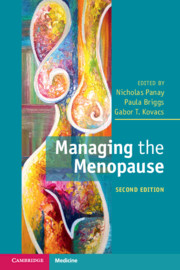Book contents
- Managing the Menopause
- Managing the Menopause
- Copyright page
- Contents
- Contributors
- Foreword
- Chapter 1 Physiology of the Menstrual Cycle and Changes in the Perimenopause
- Chapter 2 Clinical Features of the Menopause/Postmenopause
- Chapter 3 The Ovarian Reserve
- Chapter 4 Premature Ovarian Insufficiency
- Chapter 5 Premature Ovarian Insufficiency
- Chapter 6 Natural Hormone Replacement Therapy after Menopause by Ovarian Tissue Transplantation
- Chapter 7 Migraine in the Menopause
- Chapter 8 Psychological Aspects of the Menopause
- Chapter 9 Memory and Mood in the Menopause
- Chapter 10 Libido and Sexual Function in the Menopause
- Chapter 11 Vulvo-Vaginal Atrophy (VVA)
- Chapter 12 Pelvic Floor, Urinary Problems and the Menopause
- Chapter 13 The Effect of Menopause on the Musculoskeletal System
- Chapter 14 Hormonal Management of Osteoporosis during the Menopause
- Chapter 15 Cardiovascular Disease and the Menopause
- Chapter 16 Gynecological Pathology in the Menopause (Excluding Cancers)
- Chapter 17 Nutrition and Weight Gain in the Menopause
- Chapter 18 The Use of Estrogens and Progestogens in Menopausal Hormone Therapy
- Chapter 19 Androgen Therapy for Postmenopausal Women
- Cahpter 20 Contraception for the Perimenopausal Woman
- Chapter 21 Hormone Therapy and Cancer
- Chapter 22 Menopausal Hormone Therapy (MHT) and Venous Thrombosis
- Chapter 23 The Risk–Benefit Analysis of Menopausal Hormone Therapy in the Menopause
- Chapter 24 Selective Estrogen Receptor Modulators (SERMs) and Menopausal Hormone Therapy (MHT)
- Chapter 25 Non-hormonal Treatments for Menopausal Symptoms
- Chapter 26 Alternative Therapies for the Management of Menopausal Symptoms
- Chapter 27 Menopause in Primary Care
- Index
- References
Chapter 11 - Vulvo-Vaginal Atrophy (VVA)
Published online by Cambridge University Press: 18 June 2020
- Managing the Menopause
- Managing the Menopause
- Copyright page
- Contents
- Contributors
- Foreword
- Chapter 1 Physiology of the Menstrual Cycle and Changes in the Perimenopause
- Chapter 2 Clinical Features of the Menopause/Postmenopause
- Chapter 3 The Ovarian Reserve
- Chapter 4 Premature Ovarian Insufficiency
- Chapter 5 Premature Ovarian Insufficiency
- Chapter 6 Natural Hormone Replacement Therapy after Menopause by Ovarian Tissue Transplantation
- Chapter 7 Migraine in the Menopause
- Chapter 8 Psychological Aspects of the Menopause
- Chapter 9 Memory and Mood in the Menopause
- Chapter 10 Libido and Sexual Function in the Menopause
- Chapter 11 Vulvo-Vaginal Atrophy (VVA)
- Chapter 12 Pelvic Floor, Urinary Problems and the Menopause
- Chapter 13 The Effect of Menopause on the Musculoskeletal System
- Chapter 14 Hormonal Management of Osteoporosis during the Menopause
- Chapter 15 Cardiovascular Disease and the Menopause
- Chapter 16 Gynecological Pathology in the Menopause (Excluding Cancers)
- Chapter 17 Nutrition and Weight Gain in the Menopause
- Chapter 18 The Use of Estrogens and Progestogens in Menopausal Hormone Therapy
- Chapter 19 Androgen Therapy for Postmenopausal Women
- Cahpter 20 Contraception for the Perimenopausal Woman
- Chapter 21 Hormone Therapy and Cancer
- Chapter 22 Menopausal Hormone Therapy (MHT) and Venous Thrombosis
- Chapter 23 The Risk–Benefit Analysis of Menopausal Hormone Therapy in the Menopause
- Chapter 24 Selective Estrogen Receptor Modulators (SERMs) and Menopausal Hormone Therapy (MHT)
- Chapter 25 Non-hormonal Treatments for Menopausal Symptoms
- Chapter 26 Alternative Therapies for the Management of Menopausal Symptoms
- Chapter 27 Menopause in Primary Care
- Index
- References
Summary
The term vulvo-vaginal atrophy (VVA) defines the anatomic and physiological changes in the vulvo-vaginal tissues, which are directly related to reduced circulating estrogen levels, associated with menopause and aging. Atrophic vaginitis connotes a state of inflammation or infection that may be present in some women with VVA.
- Type
- Chapter
- Information
- Managing the Menopause , pp. 105 - 111Publisher: Cambridge University PressPrint publication year: 2020
References
- 2
- Cited by



